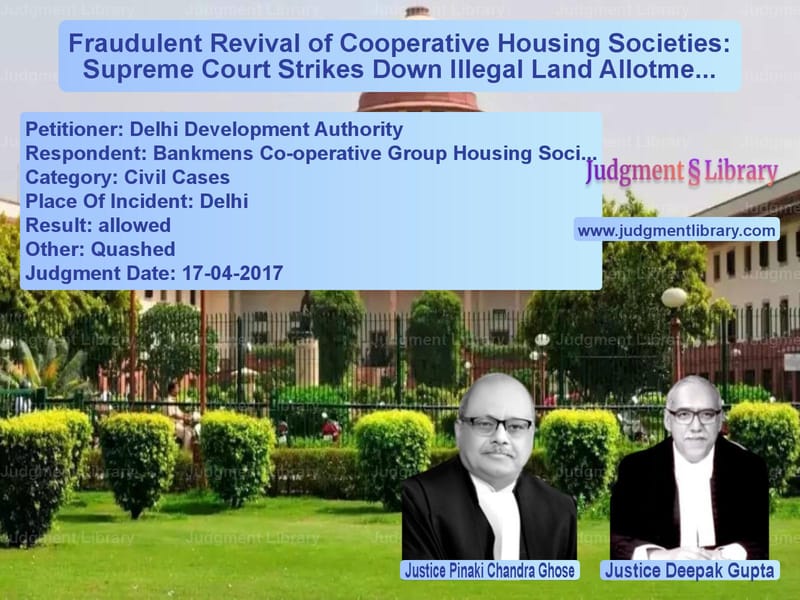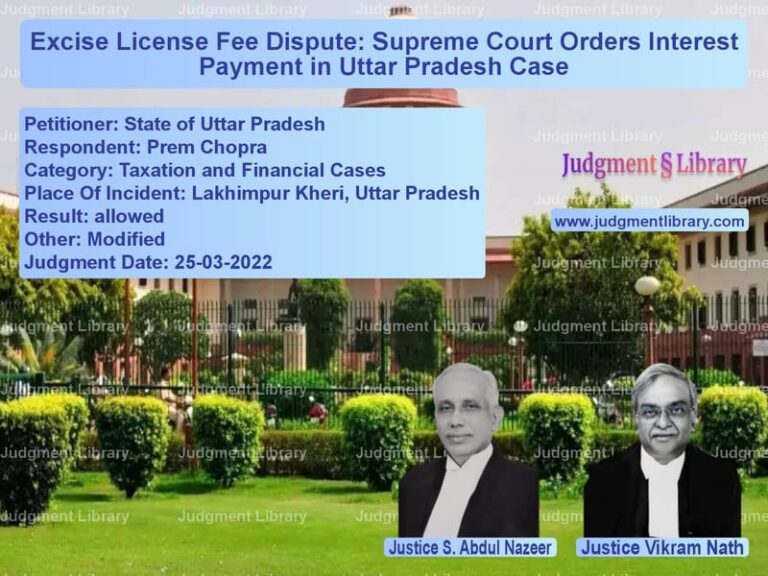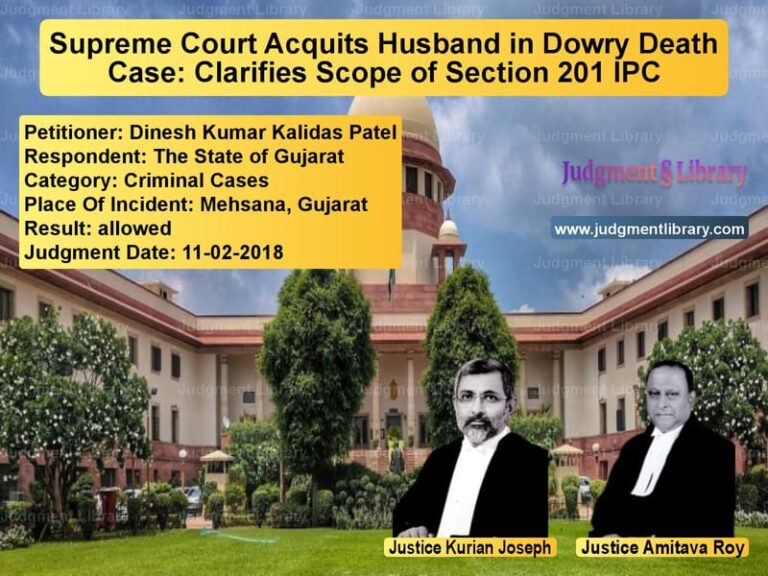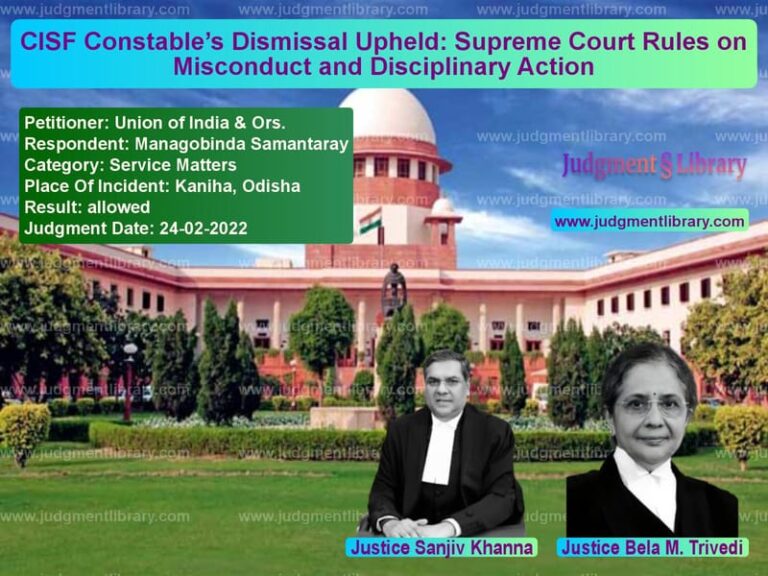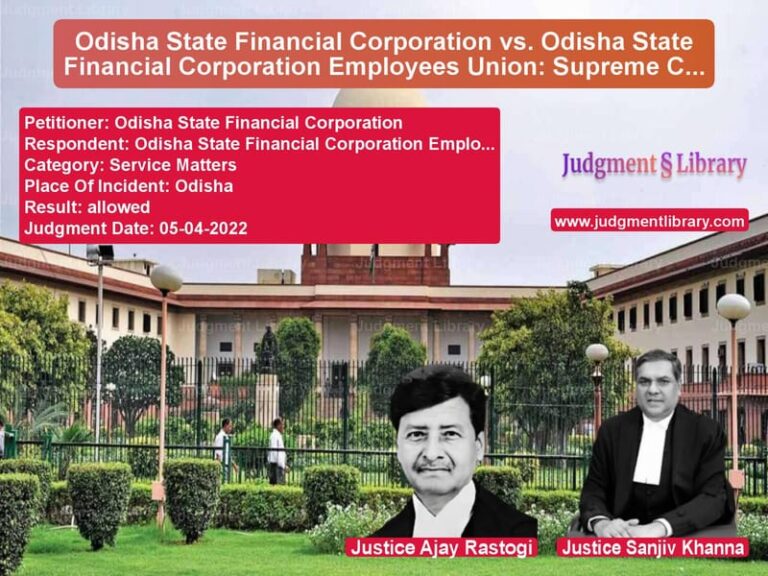Fraudulent Revival of Cooperative Housing Societies: Supreme Court Strikes Down Illegal Land Allotments
The Supreme Court of India recently delivered a landmark judgment in the case of Delhi Development Authority v. Bankmens Co-operative Group Housing Society Ltd. & Ors., addressing serious concerns about fraudulent revival of cooperative housing societies and illegal land allotments. The case involved the revival of Bankmens Co-operative Group Housing Society and Safdarjung Co-operative Group Housing Society, both of which were found to have been manipulated by builders and non-members for land acquisition.
The case revolved around the revival of defunct cooperative housing societies, alleged manipulation by builder mafias, and the role of government authorities, including the Delhi Development Authority (DDA) and the Registrar of Co-operative Societies (RCS). The court examined whether these societies were revived legally and whether their members were genuinely entitled to land allotments.
Petitioner’s Argument
The Delhi Development Authority (DDA), represented by the Solicitor General, put forth the following arguments:
- Both Bankmens CGHS and Safdarjung CGHS had been placed under liquidation years ago due to non-compliance with cooperative laws.
- The revival of these societies was initiated not by the original members but by outsiders, including builders and non-members, with fraudulent intent.
- The CBI had conducted an investigation into housing societies, finding that the revival process was manipulated and that the members listed at the time of revival were completely different from the original members.
- In some cases, members’ resignations were forged, and non-members, including real estate developers, took control of the societies.
- The High Court orders directing land allotments to these societies were erroneous, as they failed to consider the fraudulent nature of the revivals.
Respondent’s Argument
The cooperative housing societies countered the claims with the following arguments:
- The members who had applied for land allotment were genuine members who had made financial contributions.
- They were not responsible for any fraudulent activity at the time of the society’s revival and had acquired membership in good faith.
- Once the land had been allotted and payment had been made, the DDA could not deny possession of the plots.
Supreme Court’s Observations
The Supreme Court, led by Justices Pinaki Chandra Ghose and Deepak Gupta, examined the evidence and stated:
“As repeatedly held by this Court when an action is based on fraud the same cannot withstand the scrutiny of law. The revival of these Societies is mired in controversy.”
The court noted that the revival applications were filed by individuals who were not original members and that the builder mafia played a significant role in taking over defunct societies for land acquisition. The court further observed:
“We are, therefore, clearly of the view that the very revival of the Societies is illegal and that when the foundation falls the edifice which has been developed on the foundation must go.”
Judgment
The Supreme Court ruled in favor of the DDA, setting aside the orders of the Delhi High Court that had directed land allotments to these societies. Key directions included:
- The revival of Bankmens CGHS and Safdarjung CGHS was declared illegal.
- Land allotments based on these revivals were canceled.
- The money deposited by the societies for land purchase was to be refunded to their members, along with 10% interest per annum from the date of deposit.
- Authorities were directed to take appropriate actions to prevent such fraudulent revivals in the future.
Implications
This judgment has significant implications for cooperative housing societies and land allotments. It reinforces that:
- The revival of defunct societies must be done with strict compliance with cooperative laws.
- Fraudulent takeovers of societies by builders and non-members will not be tolerated.
- Government agencies must thoroughly verify membership records before approving land allotments.
- Financial contributions by members do not automatically validate an illegally revived society.
The ruling serves as a strong precedent to prevent future misuse of cooperative housing laws for land acquisition by vested interests.
Don’t miss out on the full details! Download the complete judgment in PDF format below and gain valuable insights instantly!
Download Judgment: Delhi Development Au vs Bankmens Co-operativ Supreme Court of India Judgment Dated 17-04-2017.pdf
Direct Downlaod Judgment: Direct downlaod this Judgment
See all petitions in Property Disputes
See all petitions in Fraud and Forgery
See all petitions in Landlord-Tenant Disputes
See all petitions in Judgment by Pinaki Chandra Ghose
See all petitions in Judgment by Deepak Gupta
See all petitions in allowed
See all petitions in Quashed
See all petitions in supreme court of India judgments April 2017
See all petitions in 2017 judgments
See all posts in Civil Cases Category
See all allowed petitions in Civil Cases Category
See all Dismissed petitions in Civil Cases Category
See all partially allowed petitions in Civil Cases Category

